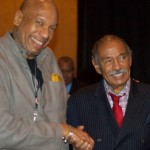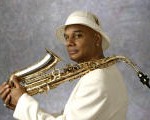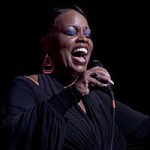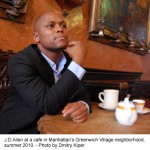The following interview was originally published by JJA News, the online publication of the Jazz Journalists Association, available at www.JJANews.org.
Throughout our series of extensive conversations with black music writers “Ain’t But a Few of Us,” I’ve been asked a question growing in persistence: when are YOU going to submit to those questions? David Adler, editor of the JJA News, recently asked that question and assigned one of the past contributors to the series — young DC-area based writer Bridget Arnwine, a past JJA Clarence Atkins Fellow — to pose the Ain’t But a Few of Us inquiry, and here ’tis repeated with permission from JJA News. (Note: Clarence Atkins was a Harlem-based jazz writer and raconteur who was mentor to a number black jazz writers. He passed on to ancestry in ’04.)

Willard Jenkins (left) with the #1 Jazzman in Congress, the honorable John Conyers, at the recent Jazz Education Network conference in New Orleans. (Photo: Bill Brower)
“Ain’t But a Few of Us”: Willard Jenkins answers his own questions to black jazz writers
Willard Jenkins is a journalist, arts consultant and presenter, co-author of African Rhythms: The Autobiography of Randy Weston, and a JJA activist from the organization’s very beginning. As keeper of the blog The Independent Ear, Jenkins has instituted a series called “Ain’t But a Few of Us,” in which he poses questions to an array of African-American jazz journalists. The goal is to shed light on an important matter: Why are there so few black media commentators on jazz?
JJA News asked our own Bridget Arnwine, a 2005 JJA Clarence Atkins Fellow based in Rockville, Maryland, to turn the tables and solicit answers to the same questions from Jenkins himself.
Bridget Arnwine: What motivated you to write about serious music?
Willard Jenkins: Well, when I was in college at Kent State University, I knew that I had an ability to write and I had a love of music. It just made sense to me to try and combine the two, so I started writing for the black student newspaper, which was called The Black Watch. And then when I graduated I got an opportunity through my father’s connection to write for the Plain Dealer and it just went from there.
BA: When you first began writing about music were you aware of the dearth of African-Americans writing about serious music?
WJ: It didn’t take long to realize that. We’re talking about the early to mid ’70s, and at that point the music was dominated by African-American musicians. I noticed whenever I did read the jazz magazines that there were few if any black writers covering the music.
BA: Why do you suppose that’s still such a glaring disparity — where you have a significant number of black musicians making serious music but so few black media commentators on the music?
WJ: That’s a complex question. On the one hand you could ask, “Hmm, have the doors not been wide open to black people writing about this music? Have we not been encouraged to write about this music? Is that it?” When you read through the various responses to that question from the series, you find different experiences. You find people talking about how they felt discouraged from writing about it and perhaps that discouragement was a result of who they were. But, on the other hand, you look at the fact that the black audience for this music is not large. So there are a lot of black folks missing the boat on this music, even as far as being listeners. Naturally that’s going to trickle down to the number of writers as well.
I do like to pose that question to other writers to see what their experience has been, and yes, we have found some discriminatory practices as far as our pursuing this music. We have found some peculiarities as black writers covering this music. You know, for example, there are some of us who’ve experienced an interesting backlash from white writers. I don’t know if maybe there’s a sense that because so many important contributors to this music have been and still are black that there’s some sense that maybe we might get closer to the source than they can or whatever. I don’t know if maybe that’s an issue with some people. I don’t know, but overall I don’t think it’s a matter of black writers being barred from writing about this music. I just think, bottom line, there haven’t been enough black people curious enough about this music to write about it.
BA: So, do you feel that mainstream publications have been good vehicles for African-American jazz writers? Do you think mainstream publications have been indifferent toward African-American jazz writers?
WJ: That’s a complex question as well. I don’t necessarily see that in 2011. I respect the people who run the mainstream jazz publications, and I’m friendly with most of them. I don’t see where there have been any openly discriminatory policies aimed at discouraging black writers. Again, I just think that we don’t have enough black writers who are interested in pursuing this music to a serious extent. On the other hand, I don’t think that those publications have done enough to encourage or even nurture black participation.
Actually, let me ask you. Do you think there have been barriers towards your pursuits with publications, because of who you are? I mean, they might not even know. Your name doesn’t give anyone a sense of who you are. But do you think that [discrimination] exists?
BA: I think I used to, when I first started. My first experience in joining the Jazz Journalists Association was as a Clarence Atkins Fellow. It was the first time I thought about pursuing writing, so I was proud to be part of a group associated with Clarence Atkins and the JJA. At the same time, I felt that experience separated me from the group a bit. Whenever I introduced myself to other members, I was “the Clarence Atkins Fellow” — it made me question how I was being perceived. Even today I don’t know how to feel when I try to solicit publications and they aren’t responsive to me. I don’t know what to think.
WJ: Yeah, because you don’t know how many others who may not be black have had a similar experience.
BA: Right, so I don’t necessarily want to say that it’s because I’m black or because I’m a woman, but I have noticed that I’ve not always been received well whenever I’ve reached out to publications and I don’t know how to feel about that.
WJ: You just have to keep pitching and find the right button to push.
BA: What’s your sense of the indifference of so many African-American-oriented publications toward serious black music?
WJ: Well, I think that the people who’ve responded to that question in this series have pretty much nailed it. It’s a matter of economics. It’s a matter of our African-American publications not being able to see the forest for the trees.
In other words, it’s a matter of [African-American publications] not feeling a need to cover a high art form, because there’s a sense that the high art form will not yield the necessary dollars to keep their pages open. And so it becomes, “Let’s pursue pop music because there’s a broader interest in that,” as opposed to African-American publications feeling an obligation to cover a music that is such an important part of the higher artistic pursuit of African-Americans in this country. They would rather go after the almighty dollar and what they perceive — and I emphasize that word “perceive” — to be a more money-making prospect, and it’s a sad aspect I think.
BA: Since you’ve been covering serious music, have you ever found yourself questioning why some musicians may be elevated over others, and is it your sense that has anything to do with the lack of cultural diversity among writers covering the music?
WJ: There have been a number of occasions when I’ve felt that way. I don’t want to cite specific artists or anything, because I don’t want to slight anybody, but I have felt that way. I have felt that certain, I like to think of them as “flavors of the month,” have been elevated because of who they are and because of who’s writing about them. Certain people who I consider to be very green are elevated as though, “Wow, they’re doing such great things.” I’m sorry, but I think, “What? Who’s this person and what have they done? They just got here.” So, yeah, I do think that that is very real.
BA: What inspired you to start your “Ain’t But a Few of Us” series?
WJ: All the things we’ve been saying for the last few minutes, because there ain’t but a few of us. We have an interesting story to tell about why there ain’t but a few of us and why we among those few decided to cover this music. It’s such a phenomenon seeing someone black writing about jazz. That’s ridiculous to me, but I just felt like I wanted to explore various points of view.
I know that as black folks writing about the music — even among black folks — we are somewhat different. I wanted to find out what peoples’ experiences were and whether aspects of race have colored their experiences, because race remains the 500-pound whatever in the room. Some people don’t want to deal with it, and other people want to deal with it too much. I was just taking a survey.
I’ve had relationships with a lot of the young black writers, including the Clarence Atkins Fellows, and including being kind of a mentor to people like John Murph, Eugene Holley and others who have written about the music. I’ve been very proud to see things that people I have been in touch with in some way are doing. I’m proud when I see your byline and your writing and that of your peers and the other Atkins Fellows. I’m happy to see that you folks are still pursuing the music. I just wanted to see what folks had to say.
BA: Why is mentoring African-American jazz writers important to you?
WJ: Because of the historic nature of this music. I don’t want people to lose sight of the nature of this music and where this music came from and the fact that this music is a high art form and an indelible part of the African experience in America. Sometimes when black folks who are into the music are around each other and talking about the music, I’ve heard this sardonic kind of joke, “Yeah, you just watch. One hundred years from now Duke Ellington will be a white man.” We kind of laugh about that, but that’s kind of serious. I never want people to lose sight of where this music came from and who is responsible for giving birth to this music and giving rise to this music. I think part of the whole aspect of having African-Americans write about this music is to keep that flame alive. Whenever I meet someone like yourself who’s interested in pursuing the music, I do all that I can to encourage them.
BA: What have been some of your most rewarding encounters over the years?
WJ: Well, I’ll start with Randy Weston. And, you know, I’ve had the great pleasure of interviewing some real giants. I’ve had some wonderful experiences interviewing Jimmy and Percy Heath. I’ve had some great experiences like interviewing Miles Davis — that was a thrill. I loved Weather Report, and I had the opportunity to interview Joe Zawinul and Wayne Shorterr together. I had the opportunity to interview Joe Zawinul in Morocco. All these various experiences have been very enriching.
I also had an opportunity to build a stage for artists as a presenter. I’ve switched hats and I’ve had an opportunity to present many, many people. I think about presenting people like Woody Shaw and Betty Carter and all kinds of people. That really enriched my life.
BA: What obstacles have you encountered in your work with jazz?
WJ: Well, I think the biggest obstacle, obviously, is going to be the lack of the kind of audience that this music deserves. It’s always a struggle, and I’m wearing my presenting hat now, it’s always a struggle trying to push the right buttons and determine how to make it happen successfully where you bring artists in and you balance the need to pay them a living wage versus what the market can bear, versus how many people you can put in those seats. It’s always a juggling act to determine what’s the proper stage for a given artist.
And for those artists who are on the more creative edge, you struggle with balancing the need to compensate them properly with the fact that their audience is not large, but you try to find ways to create an audience for music that’s meaningful to you. So, in the case of presenting on the not-for-profit stages and festivals and that kind of thing, you try to find subsidies so you can bring artists who have no particular recognition within your community but who you think are worthwhile and who you think your community could benefit from hearing. You try and get that subsidized and present it for free, so that you don’t have the burden of selling tickets. It’s a constant juggling act.
BA: What have been the most intriguing records you’ve heard recently?
WJ: That’s always a hard question. Let’s see, I’ve enjoyed listening to two of the young ladies who were in the last Monk competition, Cécile McLorin Salvant and Charenée Wade. Randy Weston’s The Story Teller: Live at Dizzy’s record. I’ve also been enjoying the Trio 3 record with Geri Allen, Ahmad Jamal’s A Quiet Time as well as the Ahmad Jamal box set on Mosaic, and Chucho Valdés, Cassandra Wilson and Danilo Pérez’s new records.
(See the Songs That made the Phones Ring listing elsewhere in The Independent Ear for more personal faves from 2010.)








